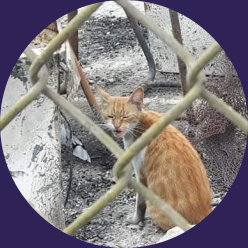On Wednesday , September 9, the Reception and Identification Center in Moria burned down completely. The migrants detained there remained on the streets for days without access to basic necessities until they were forced by the police to move to the new -closed- camp of Kara Tepe. One would expect a report from Lesvos Island to refer primarily to the daily violence experienced by the migrants there.
However, there is a need to shed light on another, parallel story that concerns the dozens (estimated at around 70-100) of cats and dogs who until the fire lived with the migrants either inside the KIT or in the so-called “jungle”, the olive groves that extend to the right and left of the official camp.
During this long stay of the migrants in Moria, many dogs and mainly cats found shelter in the facilities. These animals were adopted by the caged inhabitants of Moria, lived with them and shared water, the little food and roof. After the chaos that prevailed during the fire, the evacuation of the area and the forced removal of all migrants from Moria, these animals were violently separated from their human companions. The ban on leaving the Kara Tepe camp no longer allows migrants to look for their pet in the former camp. There is also information that animals were not allowed to enter the new camp from the beginning.
Today all these dogs and cats are left without any help, water or food. Many have health problems that either pre-existed or were acquired due to the fire. They are injured or have burns and eye problems. Some are in shock due to the situation they experienced. The sickest of them are treated and temporarily accommodatet in houses by the few people who deal with this part of the general tragedy. The rest wander around fasting and thirsty among the burned leftovers, other dead animals and piles of rotten garbage looking for the people who disappeared overnight.
We would like to find shelter for as many of these animals as we can. The chances of surviving in the remaining hell are few as they are all used to live with humans. It is important to find homes outside and inside Lesvos and people who will take care of them, treat them and love them.
There is need for money for vaccinations, booklets and other formal procedures necessary for their transportation from the hellhole of Moria to Athens. But the key is to find people who will adopt them permanently
